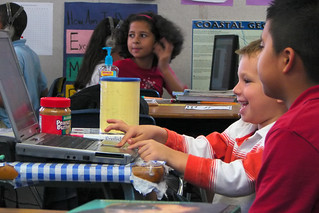Inspired by
Isabela’s post on assessment and learning outcomes, I started looking for
alternatives to oral assessment and came across this interesting idea on Mr. Negrete’s EFL Blog. Mr Negrete’s students created
videos in English, which were then put up for voting. The students whose video
received the most votes would be exempt from the oral part of the midterm
examination. If the aim of the oral assessment is indeed to verify whether
students have attained the subject matter, then I believe this was a successful
project.
 One way
this form of assessment could be adapted to our EFL teaching reality would be
to have students produce either videos or audio podcasts, in which they would
use the target language. Even though the product would serve for assessment, I
believe one of the main benefits would be all the rehearsing students would go
through before handing in a final project, versus the one-chance-only they
would have in an oral exam setting, not to mention the reduction in students’ stress
and anxiety that usually come with tests.
One way
this form of assessment could be adapted to our EFL teaching reality would be
to have students produce either videos or audio podcasts, in which they would
use the target language. Even though the product would serve for assessment, I
believe one of the main benefits would be all the rehearsing students would go
through before handing in a final project, versus the one-chance-only they
would have in an oral exam setting, not to mention the reduction in students’ stress
and anxiety that usually come with tests.
Some
considerations for such a final project:
- Students must know it is a graded exercise (the oral test grade!) and how they will be assessed; rubrics should be clear for students.
- There must be defined tasks; that is, students must know what needs to be present in the final product;
- Students must have the option of taking the oral test if they choose to;
- The teacher must guide students throughout the project, offering orientation and guidance; there must be dates when subproducts are presented, so that any changes can be made before the final product is put up for grading.
A simple
example, considering a teacher who wants to test students’ ability to describe people, would
be to have them record a game of Guess who?, testing not only describing people
but also asking questions. Another variety would be to have students have a
telephone conversation, in which one of the students needs to write down a
message and deliver it to a person he/she does not know, be it in a party or in
a meeting room, with the description and directions given by the other student.

